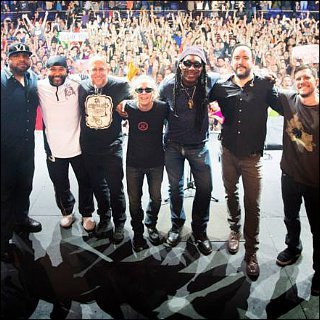 Even when they had not yet produced a single album, Dave Matthews Band already has built their own success through their impressive live performances. With an uncommon blend of jazz, rock, funk, folk, world beat, and even Latin grooves, they have displayed what has been considered as something that is uniquely different from what other jam bands commonly do. The results were the extraordinary compositions, either studio or live albums, which mostly sold for millions copies and unquestionably led to Platinum status. This fantastic accomplishment wonderfully also is supported with the solid base of the band's formation and chemistry which the frontman of the band, Dave Matthews, has admitted of. �We just enjoy ourselves and I think the tightness comes from just knowing each other,� he said. �No two takes in the studio ever sound the same either, when we're in there, so it's sort of the same thing. No two nights repeat themselves too much.� Glancing at all of these, it is very proper then to address Dave Matthews Band as one of the greatest music artists in the world.
Even when they had not yet produced a single album, Dave Matthews Band already has built their own success through their impressive live performances. With an uncommon blend of jazz, rock, funk, folk, world beat, and even Latin grooves, they have displayed what has been considered as something that is uniquely different from what other jam bands commonly do. The results were the extraordinary compositions, either studio or live albums, which mostly sold for millions copies and unquestionably led to Platinum status. This fantastic accomplishment wonderfully also is supported with the solid base of the band's formation and chemistry which the frontman of the band, Dave Matthews, has admitted of. �We just enjoy ourselves and I think the tightness comes from just knowing each other,� he said. �No two takes in the studio ever sound the same either, when we're in there, so it's sort of the same thing. No two nights repeat themselves too much.� Glancing at all of these, it is very proper then to address Dave Matthews Band as one of the greatest music artists in the world.
The inception of the band certainly could not be separated from Dave Matthews himself (born on January 9, 1967 in Johannesburg, South Africa). A bartender at a jazz club in Charlottesville, Virginia named Miller's, he actually possessed a desire to make a demo tape of the songs he had written before in order to establish his own band. Upon his meeting with Leroi Moore (born on September 7, 1961 in Durham, North Carolina) at his workplace, he asked this seasoned jazz player to assist him adding depth to his tunes. Moore responded positively after he came to Matthews' house with Carter Beauford (born on November 2, 1972 in Charlottesville, Virginia) and listened to few songs that Matthews had recorded. The band shortly thereafter added 16-years-old musical prodigy Stefan Lessard (born on June 4, 1974 in Anheim, California) based on the recommendation of the substantial local jazz guru, John D'earth. This was quickly followed by the recruitment of Boyd Tinsley (born on May 16, 1964 in Charlottesville, Virginia) and Peter Griesar.
As the band was fixed in 1991 with a temporary name of Dave Matthews Band, Matthews took position as the lead vocalist/guitarist, while Moore served as the saxophonist, Beauford as the drummer, Lessard as the bassist, Tinsley as the violinist, and Griesar as the keyboardist. Setting out to build a stronghold to their base, these six talented men carried out their first gig on May 11, 1991 at a private rooftop party held by Lydia Condor at the South Street Warehouse in Charlottesville. Within a short time, they had already participated at the town's Earth Day Festival, which was their initial public performance in the same year. Words about their remarkable skills soon spread widely throughout Virginia, leading the band to be invited to play at local clubs, including Flood Zone and Trax. In the meantime, the personnel intended to find a new name for their band, but it appeared to them that �Dave Matthews Band� had taken roots in their audiences.
Looking on the enthusiasm of their fans, Dave Matthews Band resolved to gather all of their materials into an album. However, Griesar surprisingly made a decision to quit from the band in March 1993 before the recording process was finished. Undistracted, the five remaining members went on, thus eventually released �Remember Two Things,� an independent LP under their own label called Bama Rags, on November 9, 1993. Much to their delight, it scored a great result as the sale reached 1 million copies, automatically making RIAA bestowed Gold status to the album. This early success directed them to secure a recording contract with RCA Records, which later reissued �Remember Two Things� on June 24, 1997. The band afterwards put full concentration to work on their major-label debut album, �Under The Table and Dreaming.� Produced by Steve Lillywhite, this piece of work turned out brilliantly when it was launched on September 27, 1994. Entering the top 20 of The Billboard 200 Album Chart, it sold for about 6 million copies, therefore was certified four times Platinum.
This tremendous attainment of �Under The Table and Dreaming,� without doubt, had brought Dave Matthews Band to the surface. As their popularity grew, the band embarked on their first tour in U.S. and Europe for almost a year. It was not until the fall of 1995 that they returned to the studio to record their next album entitled �Crash.� Released on April 30, 1996, it marked the highlight of their music career for this album's sale amazingly resulted in 7 million copies while also soared to the 2nd rank of The Billboard 200. This accomplishment came to its peak when they won the category of Best Rock Performance By A Duo or Group With Vocal at the 39th Annual Grammy Awards in 1996 through their track from �Crash� entitled �So Much to Say.� Getting extremely famous across the country and also the world, the band kept gaining success through their next works. Their official double-disc live album �Live at Red Rocks 8.15. 95� (1997) led them to once again receive Platinum while their third RCA album, �Before These Crowded Streets� (1998), strived to number one on The Billboard 200.
The band went steady in 1999, coming up with two other live albums which both followed the great achievement of their previous one. �Live at Luther College,� featured Tim Reynolds who had been involved in all of the band's albums and also joined their tours as a guest artist, and �Listeners Supported� contained the unreleased track of �#40.� Spent most of the year 2000 to hold their tour, it seemed that they hardly had the time to produce another album, yet �Everyday� surprisingly could make its way to touch the market on February 27, 2001. In time, the process behind the making of the album did not run smoothly for the band encountered a conflict with their long time producer, Steve Lillywhite. This caused them to abort the recording sessions they had with Lillywhite as well as to end their seven-years relationship. The band quickly took collaboration with veteran producer Glen Ballard, thus rearranged a new material which then resulted in �Everyday.�
Despite the huge achievement of �Everyday� to be a triple Platinum album, the band's fans were discontented with this particular work since they felt that its tunes weren't as great as its predecessors. This dissatisfaction led to the urge toward Dave Matthews Band to unleash the 2000 studio sessions with Lillywhite after the raw record was leaked on the Internet. Known as �The Lillywhite Sessions,� it was responded ardently, gaining huge praise from both the fans and media. Intending to please the public, the band ultimately reworked the shelved compositions plus added two new songs, which was actualized in �Busted Stuff� (2002). To everyone's expectation, the album rocketed to the 1st rank of The Billboard 200, satisfyingly selling three million copies. The band afterwards spent the following years to embark on tours and only produced some live albums, such as �The Central Park Concert� (2003) and �The Gorge� (2004), also a series of their exclusive performances. During this period, Matthews and Tinsley took their time to produce a solo album; Matthews with �Some Devil� (2003) while Tinsley with �True Reflections� (2003).
An incident happened to Dave Matthews Band in August 2004 as they faced three private lawsuits, which accused the band of throwing liquid human waste into a Chicago river architectural tour boat from their tour bus. In spite of the personnel's denial, Chicago police claimed that they have the surveillance tapes around the bus' area. It was later found out that the driver of the band's bus named Stefan Wohl was the one who conducted the awful deed. He, therefore, was sentenced to probation as well as ordered to do community service besides being fined. Aside from this case, the band focused their attention to compose their sixth album entitled �Stand Up� which finally was launched on May 10, 2005. The album repeated the success that their other previous albums had experienced, getting number 1 on The Billboard 200 with the excellent sale of 465,000 copies in its first week. The band also issued the fourth installment of their live album series, �DMB Live Volume 4: 4.30.96 Classic Amphitheatre, Richmond, VA� on September 2.








